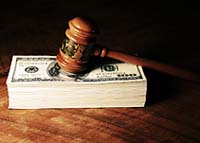Bankruptcy is both a relief and a relief. On the other, you will no longer receive calls from bill collectors and you can work on your finances. The following article below discusses some tips to make bankruptcy less painful.
Be certain to gain a thorough understanding of personal bankruptcy via looking at websites on the subject. Department of Justice and American Bankruptcy Attorneys provide free advice.
Avoid ever touching retirement accounts whenever possible. Although you may need to tap into your savings, ensure that you leave enough in your account for emergencies.
Unsecured Credit
You may still have trouble with getting unsecured credit after filing for bankruptcy. If this happens to you, you may want to think about getting a secured card or two. This demonstrates to creditors that you’re serious when it comes to having your credit. After using a secured card for a certain amount of time, you may be able to get unsecured credit again.
Filing for personal bankruptcy may possibly enable you to reclaim your personal property that have been repossessed, including cards, electronics or other items that may have been repossessed. You should be able to get your possessions back if the repossession occurred fewer than 90 days before you filed for bankruptcy. Speak with a lawyer who will be able to help you with guidance for the entire thing.
Filing bankruptcy does not necessarily mean you will lose your home. Depending on whether the value of your home has decreased or if you have a second mortgage on the home, you might be able to keep it. You are still going to want to check out the homestead exemption because it may allow you to keep your home.
Understand the differences between a Chapter 7 and a Chapter 13 bankruptcy.Take the time to find out about each one online, and then figure out which one will be best for your particular situation.If anything you see is unclear or doesn’t make sense, consult with your attorney about the details before you decide which type of bankruptcy you want to file.
In order for this to be considered, your car loan must be one with high interest, have a higher interest loan for it as well as a consistent work history.
Before going through the Chapter 7 filing process, take time to think about anyone it could affect. However, if you had a co-debtor, which spell financial disaster for them.
It is possible for those going through the bankruptcy process to feel unworthy, remorse and embarrassment.These feelings can cause you and cause psychological problems.
Bankruptcy is a host of other physical and emotional issues.To help yourself deal with this stressful situation, hire a good lawyer. Do not choose your attorney based on cost. It is not necessary to engage the lawyer who charges the highest fees; all you need is a costly attorney; just make sure he or she is qualified to handle your case. Make sure that you verify their reputation through various sources including people who have experienced bankruptcy give your circle of friends and the BBB. You might want to visit a court hearing to see how an attorney handles his case.
Personal Bankruptcy
Research the rules and regulations of personal bankruptcy before filing your petition. There are a lot of pitfalls in the personal bankruptcy laws that could cause you upsets. Some mistakes could lead to your case being dismissed. Do as much research as possible about bankruptcy before taking the next step. This will make the entire process easier.
Consider all available options before filing for bankruptcy. You might want to consider credit counseling. There are many different non-profit organizations that can help you. They will work with your creditors to get your payments lowered and interest. You can even pay your creditors.
Make a prompt decision to accept more responsible fiscally before you file. Avoid running up current debts or taking on new debt right before filing for bankruptcy. Creditors and even judges look at your current and past history when they make a decision about your personal bankruptcy. You should show the court that you have changed and are ready to act in a financially responsible manner.
Filing bankruptcy will always have good and bad sides. Whatever your reason for doing it, keep in mind that information is the strongest ally you have throughout the entire process. These tips can make dealing with bankruptcy easier. Apply all of the knowledge you have gained from this article and you will be on your way to feeling more at ease about your bankruptcy.





